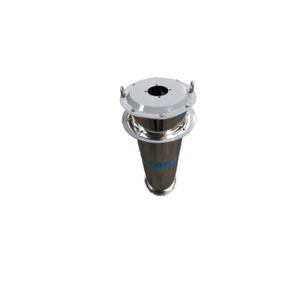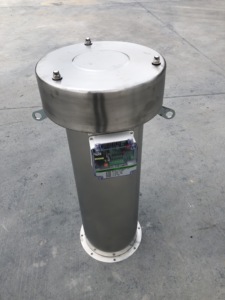(4734 products available)

















































































































































Mini cyclone can be sorted into several classes judging by the job they perform. It is worth considering these types because each form answers to unique needs in the process of extracting dust.
These cyclones are widely used in light duty applications because it is less expensive. Operational, plastic mini cyclones work the same as the others, but their construction makes them less suitable for high-temperature or high-risk environments.
Metal mini cyclone separators like aluminum or steel mini cyclone are always preferred at high temperature or where explosive dust is expected. These devices are usually more expensive and safer than plastic ones. The strength and life cycle of metal cicones make them a necessary choice for critical functions.
This specific equipment uses electrostatic fields to enhance the dust particle separation process. It is usually found in areas where extremely high precisions of air cleansing are required, such as industries or cleanroom facilities.
These cyclones are made for the harshest working environments, including ones where corrosive materials are present. The PVC coating adds a layer of defense, which enables the cyclone to function effectively in outdoor tasks with high or low humidity, such as in mining or chemical processing. PVC-coated cyclones are equally excellent for prolonged outdoor installation when protective mobile covers are rarely or never used.
Mini cyclone dust collectors feature several characteristics or functionality that set them apart from the other dust extraction methods.
The most important feature of a mini cyclone is its compact size. This function makes them very useful in situations where space is limited, such as in small workshops or laboratories. Despite their small size, mini cyclones effectively separate large particles from the air.
All mini cyclones generate strong swirl, which helps separate dust from the air. This activity is called 'cyclone action' and can separate even the most stubborn particles.
Mini cyclones have a dust collection efficiency of above 99%. That is why they are mainly used where very clean air is needed, such as in the food, chemicals, and pharmaceuticals sectors.
Small cyclones have no filters to change, simplifying their maintenance and reducing associated costs. Most may be cleaned through periodic manual washing or, more conveniently, automated systems.
Mini cyclones are popularly made of metal as the materials are exposed to longer usage and weather elements. That is why they are sturdier than their size suggests. They were made with hard materials to last even in the most demanding environments.
They can be used anywhere from industrial centers to woodworking shops to laboratories. Mini cyclones might be small, but they think big when it comes to keeping the air clean.
A mini cyclone dust collector can be utilized in numerous industrial sectors. They assist in keeping the workspace cleaner and safer.
Wood chips and sawdust are normal in woodworking operations. Channeling these wastes through mini cyclones leaves a clean workspace. Workshops will not need to worry about damaging their machines due to sawdust accumulation.
Dust control is especially important in this sector because of the fine powders in use. Large dust particles can also cause product contamination or mechanical damage, so mini cyclones help avoid this. They also enable a longer shelf life for the equipment by cutting down on wear and tear.
Material related to food processing such as flour, sugar, starch, and spices will produce fine particles that require collection. Mini cyclones help keep these particles from polluting the air and creating unsafe working conditions. They contribute to higher food processing quality by controlling dust and improving hygiene.
Certain processes, such as cutting or grinding, create metal dust that can be dangerous when breathed in. Mini cyclones are vital for protecting workers while also helping to keep the work environment safe. They also contribute to better machine performance by reducing the amount of dust present.
Because this industry handles fine particles and sensitive materials, clean air is critical. Mini cyclones ensure these particles are collected, avoiding contamination and damage to product components. They are equally essential in ensuring compliance with safety measures.
Mini Cyclones ensure that hazardous materials are not airborne, which can threaten health. They also limit chemical dust concentration in the air, reducing explosion risk. They are necessary pieces of equipment for safely processing many chemical materials.
Printing produces inks and papers that create dust and debris. Mini cyclones help maintain a clean work area to keep the printing machines running smoothly and prolong the equipment's lifespan. Their contribution to cleanliness in the workplace affects the quality of prints and overall equipment maintenance.
Choosing the right PVC-coated cyclones requires a careful analysis of many elements. Knowing these factors guarantees that the right cyclone is chosen for a given task.
Material: mini cyclone coherence materials have a significant influence on its lifetime and effectiveness. Mini cyclone variations, including plastic and metal, also have different levels of durability, especially in diverse temperature and environmental conditions. While plastics are reasonable and ideal for dry applications, metal or PVC-coated cyclones provide better resistance to heat and chemicals. This makes them suitable for severe tasks.
Separation Efficiency: Another crucial consideration is separation efficiency. This determines how efficiently a cyclone can remove particles from the air. Higher separation efficiency is normally required in sectors such as pharmaceuticals or food processing, resulting in cleaner air. Selecting a cyclone with the appropriate efficiency rating is critical for meeting cleanliness requirements in an area.
Application Type: The form of application determines the size and capacity of the chosen cyclone. Mini cyclones work wonderfully with small-scale applications where space is at a premium. Larger cyclones will be needed for industrial applications that require more volume. Understanding the complexity of the project permits for the appropriate size to be elected to ensure effective operation.
Installation: The ease with which the cyclone can be installed in a current system must be considered. Many systems are created with the typical dimensions in mind, making installation simpler. Also, selecting a model with adjustable inlets and outlets can make integration into any system much less difficult. When the cyclone is easy to install properly, it guarantees that the system will perform at its best from the start.
Maintenance: Maintenance influence may die-cast the choice of the type of cyclones in many organizations. Filtered systems often outcome in higher maintenance demands due to the need to replace filters regularly. Mini cyclones have the bonus of minimal maintenance required, as there are no filters to replace, though frequent cleaning of the cyclones might be required. This consideration supports the selection of a system with minimal maintenance needs to reduce downtime in the workplace.
A1: Mini cyclones boost air quality, enhance workplace security, and safeguard critical equipment. With their high efficiency in cleaning up dust and debris, they assist in maintaining a cleaner and more functional workspace.
A2: Mini cyclones are low-maintenance devices that do not require much work. They do not require replacement filters like other dust collectors. Instead, users must clean the cyclones often to ensure they work to their fullest capability. This cleaning may be done manually or through automated methods that require little time from employees.
A3: Mini cyclones consume less power than other dust remove devices because they are small in scale. Most run on small motors, providing good energy savings. Their outstanding efficiency in separating dust from the air also means they use less energy to do the work effectively. This makes them an excellent choice for sustaining energy economy and high performance.
A4: Mini cyclones are typically fabricated from plastic or metal, depending on the application requirements. While plastics are affordable and ideally suited for dry use, metal provides excellent resistance against heat and chemicals. Metal mini cyclones should be fabricated from stainless steel for chemical and pharmaceutical processing. PVC-coated cyclones can be used as well for additional protection.
A5: While they are mostly designed to separate larger particles, mini cyclones can also work with finer dust particles when fitted with the right type of dust collector filter.